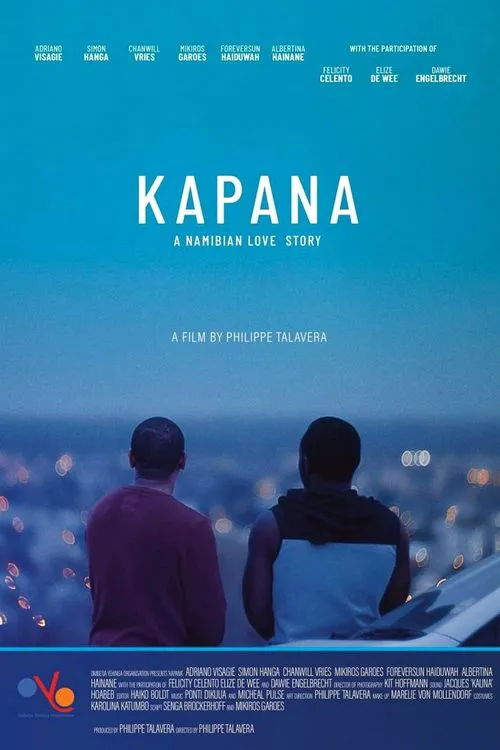Kapana

Plot
In the heart of Windhoek, Namibia's capital city, two men from different walks of life cross paths in an unexpected encounter that would change the trajectory of their lives forever. George, a middle-class insurance broker in his mid-30s, has built a seemingly comfortable and secure life in the city centre. He appears to have it all together – a promising career, a well-maintained home, and a respectable social status. However, George harbours a secret that he dare not speak out loud: he is gay. Simeon, on the other hand, is a kapana seller from Katutura, the township in Windhoek where many of the city's residents live in poverty. He sells grilled meat from a makeshift stall, earning just enough to make ends meet. Simeon's life is far from comfortable, and his existence is marked by hardship and marginalization. Despite these challenges, he exudes a strong sense of resilience and determination. Like George, Simeon too has a secret: he is in a same-sex relationship with a man named Tiko. The lives of George and Simeon intersect at a small bar, where they coincidentally cross paths. Their initial meeting is cordial, but it's clear that both men are hesitant to reveal their true selves. As they strike up a conversation, they find common ground in their shared struggles and their desire for human connection. The conversation flows easily, and they discover that they share a passion for music and a deep longing for acceptance and love. As the night wears on, George and Simeon's connection deepens, and they exchange contact information. Their initial meeting is followed by a series of clandestine encounters, each one marked by a sense of excitement and trepidation. Despite the risks involved, they are drawn to each other, and their relationship blossoms. However, their love is not without its challenges. As they navigate their newfound romance, they must confront the harsh realities of Namibia's conservative society. The country's laws still criminalize sodomy, and gay relationships are stigmatized and often violently persecuted. The couple's fear of being discovered leads them to lead double lives, keeping their love a secret from their friends, family, and even themselves. Tiko, Simeon's partner, becomes a confidant and a source of support, providing a safe space for Simeon to express himself and to explore his feelings. George, too, finds solace in Tiko, who becomes a bridge between the two men. As they navigate their complex web of relationships, they begin to realize that their love is not just a fleeting infatuation but a deep connection that transcends the boundaries of society's expectations. The film takes its name from Simeon's occupation, "kapana," which is a traditional Namibian dish made from grilled meat. Just as the flavors and textures of kapana come together to create a delicious and satisfying meal, the lives of George and Simeon intertwine in a way that is both unexpected and profound. As the story unfolds, the cinematography captures the stark beauty of Namibia's desert landscapes and the vibrant colours of the township's markets. The film's portrayal of the country's complexities and contradictions serves as a powerful backdrop for a love story that defies the odds. Ultimately, "Kapana" is a poignant exploration of the human desire for connection, acceptance, and love. In a world where the boundaries between truth and secrecy are constantly blurred, George and Simeon's story serves as a testament to the power of love to bring people together, even in the face of adversity.
Reviews
Recommendations




